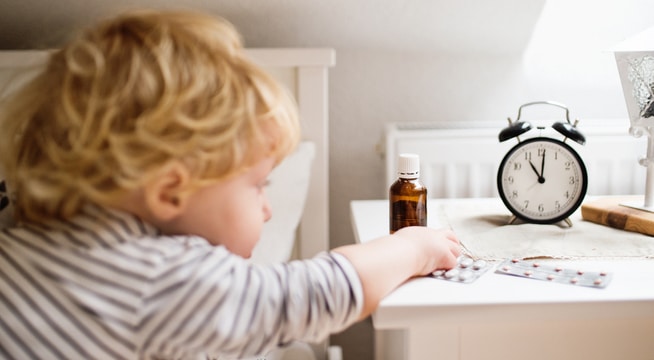What to Do If Your Child Eats Something Toxic
Children's Health
•
Sep 3, 2019

You always hear that once a baby starts walking, it’s all over. That’s because toddlers and small children tend to grab and eat things that they shouldn’t, and keeping track of them becomes harder to do once they’ve learned how to crawl or walk and reach out for things. In 2017, 39,100 children under the age of six consumed or were in contact with something poisonous. This exposure peaks for one- to two-year-olds, and then spikes again for teenagers 13-19 years old. What can you do if your child eats something toxic, and how can you keep your child safe from poisonous substances?
What Products are Toxic for a Child?
The best way of preventing your child from being exposed to toxic or poisonous substances is to be mindful of the type of substances that can be poisonous to children, and keeping them safely out of reach. These products include:
- Medications – whether found and ingested or in incorrect dosage quantities
- Household products and pesticides – such as bleach, detergent, paint thinners, drain cleaners, and more
- Household plants – such as daffodils, hydrangeas, lilies, and other plants
- Alcohol, nicotine, and illicit substances
- Hydrocarbons
- Batteries
- Personal care products – such as perfume, nail polish remover, and more
- Undercooked or poorly kept foods
You should also be mindful of carbon monoxide produced by fuel-burning appliances that aren’t properly functioning. Carbon monoxide poisoning has flu-like symptoms and includes nausea and fatigue. By installing a carbon monoxide detector, you can keep your family safe.
How to Recognize the Signs and Symptoms
Symptoms of poisoning can range depending on the substance and how it was exposed. Some signs include:
- The pupils enlarging or shrinking
- Excessive drooling or dry mouth and skin
- A faster or slower than normal heart rate
- Trouble breathing
- Pain
- Hyperactivity or drowsiness
- Confusion
- Nausea
- Vomiting
- Lack of appetite when normally hungry
- Nervous system abnormalities
- Abnormal skin coloring
- Seizures
It can be difficult to determine if your child has been exposed to something toxic, so the best thing you can do is to be aware of their actions and trust your gut if you see sudden changes.
What To Do If Your Child is Exposed to Toxic Substances
If you know your child has ingested, breathed in, or absorbed poison, don’t wait for any signs or symptoms. Instead, follow these steps:
- Identify the substance – if the substance has packaging that addresses poisoning cases, follow the instructions.
- Take note of your child’s health status. Do they currently appear fine, or are they showing symptoms – vomiting, drowsiness, coughing?
- Call the US National Poison Control Center (1-800-222-1222) and give them as much information as you can. Get advice on what you should do now and any next steps.
- Take a picture of the substance. If it was a berry or other type of wild plant, take a picture of the leaf or plant to help identify it.
- Keep your child calm and still. Running around can cause the metabolism to increase and quicken symptoms.
- Call 911 if your child shows any sudden changes — including vomiting or drowsiness. The emergency operator will provide immediate instructions on what you can do while you wait for an ambulance. It’s important that you don’t try to drive the child yourself, as driving erratically could put you, your loved one, and other drivers at risk. This exception is only made if the emergency services operator suggests driving to meet the ambulance or in the case that it’s quicker for you to get to an emergency room than for an ambulance to get to your home.
What Not To Do If Your Child is Exposed to Toxic Substances
When your child is hurting, and stress is high, it can be common for you to want to try and resolve the issue immediately by using at-home remedies. In the past, some of these remedies have included giving Ipecac which induces vomiting. Since then, the American Association of Poison Control Centers and the American Academy of Pediatrics have recommended against it. Other immediate solutions may include giving activated charcoal, but you should wait for medical personnel to determine if that treatment is appropriate. The best thing you can do for your child if they’ve been poisoned or exposed to toxic substances is to follow the steps above and call the US National Poison Control Center.
Emergency Services in Colorado Springs and Texas
If you or a loved one has been exposed to poisonous substances, we can provide the care you need. If you have questions or need immediate treatment, your nearest Complete Care location is ready to help, no matter the time of day or night. We offer a variety of services to help you and your family in your time of need. No appointments are necessary.
Find the Complete Care location nearest you.
